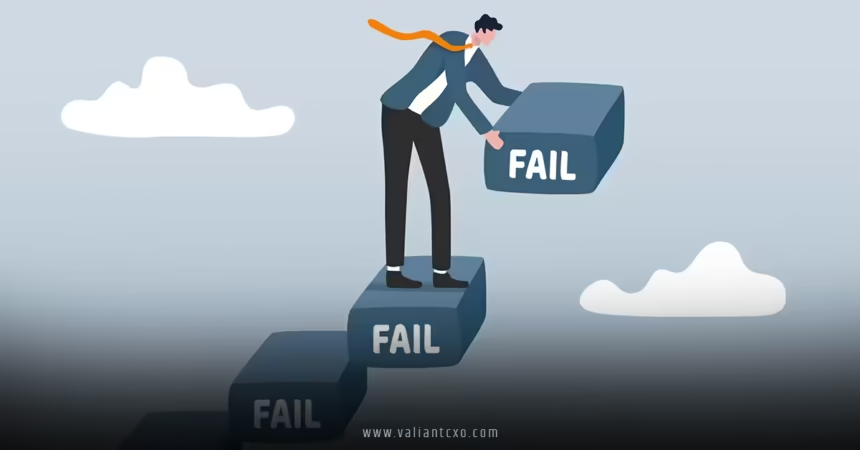Practical steps to overcome fear of failure begin with recognizing that this nagging dread isn’t some unbeatable monster—it’s more like a pesky shadow that follows you around, whispering doubts until you decide to shine a light on it. Hey, have you ever felt that gut-wrenching hesitation before trying something new, like launching a business or asking for a promotion? You’re not alone. Millions wrestle with this fear daily, but the good news is, there are practical steps to overcome fear of failure that can transform it from a roadblock into a stepping stone. In this guide, we’ll dive deep into why it happens, how to spot it, and most importantly, those actionable, real-world strategies to break free. Let’s turn that fear into fuel, shall we?
Understanding Fear of Failure: Why It Holds Us Back
Before we jump into the practical steps to overcome fear of failure, let’s unpack what this fear really is. Imagine fear of failure as an overprotective guard dog—it’s there to keep you safe from harm, but sometimes it barks at shadows and prevents you from exploring the yard. Psychologically, it’s known as atychiphobia, a phobia that makes you dread not succeeding so much that you avoid risks altogether. It’s not just about flopping on a task; it’s tied to deeper worries like embarrassment, loss of respect, or even shattering your self-image.
Why does this fear grip us so tightly? Often, it stems from our upbringing. Picture a kid who’s praised only for straight A’s and punished for anything less—fast-forward, and that child grows into an adult terrified of imperfection. External pressures play a huge role too, like societal expectations or workplace demands where one slip-up feels like career suicide. And don’t forget genetics; if anxiety runs in your family, you might be more prone to this fear, amplifying everyday worries into full-blown phobias. Rhetorically speaking, isn’t it wild how something meant to protect us can end up imprisoning us? But understanding these roots is the first crack in its armor.
Common Causes of Fear of Failure
Diving deeper, the causes of fear of failure aren’t one-size-fits-all—they’re a messy cocktail of past experiences and current stresses. Trauma from previous failures, like bombing a big presentation and facing ridicule, can leave lasting scars, making you vow never to try again. Perfectionism is another culprit; if you’re the type who needs everything flawless, any hint of shortfall feels catastrophic. Then there’s learned behavior—watching parents or mentors treat mistakes as taboos teaches you to do the same.
Low self-esteem feeds into this too, where you seek constant validation and crumble without it. External factors, such as high-stakes environments at work or school, crank up the pressure. Even fear of success sneaks in sometimes; succeeding means more responsibility, and what if you can’t handle it? These causes intertwine, creating a web that’s tough to escape without deliberate effort. But here’s the kicker: acknowledging them is a practical step to overcome fear of failure, because knowledge empowers change.
Signs and Symptoms: Do You Have Fear of Failure?
How do you know if fear of failure is sabotaging your life? It’s sneaky, often masquerading as caution or realism. One big sign is reluctance to try new things—you stick to your comfort zone like glue, avoiding challenges that could lead to growth. Self-sabotage is another red flag; maybe you procrastinate on important tasks or undermine your efforts subconsciously.
Physically, it hits hard: racing heart, sweaty palms, or even digestive woes when facing a risk. Emotionally, you might feel helpless, anxious, or depressed, with negative self-talk looping in your head like a bad playlist. Worrying about disappointing others? That’s classic. Or perhaps you downplay your goals, acting indifferent to avoid the sting of potential failure. If these sound familiar, it’s time to address them head-on with practical steps to overcome fear of failure. After all, ignoring the signs only lets the fear fester.
Practical Steps to Overcome Fear of Failure
Now, the heart of it: practical steps to overcome fear of failure. These aren’t fluffy theories—they’re grounded, actionable tactics drawn from psychology and real-life success stories. I’ll break them down step by step, so you can implement them today. Remember, progress isn’t linear; it’s like building a muscle, strengthening with each rep.
Step 1: Acknowledge and Accept the Fear
First off, own it. Practical steps to overcome fear of failure start with admitting it’s there. Ask yourself: What am I really afraid of? Is it judgment, loss, or something else? Journaling helps here—write down your fears like listing ingredients in a recipe, making them less intimidating. Acceptance isn’t surrender; it’s the launchpad for change. As experts note, recognizing failure as normal shifts your perspective from dread to opportunity. Think of it as greeting an old acquaintance: “Hey fear, I see you, but you’re not calling the shots anymore.”
Step 2: Redefine What Failure Means
Here’s a game-changer: redefine failure. Instead of seeing it as a dead end, view it as feedback—a detour sign on the road to success. Successful folks like Thomas Edison failed thousands of times before inventing the lightbulb; he called them “ways that won’t work.” Practical steps to overcome fear of failure include flipping the script: Ask, “What can I learn here?” This mindset shift, often called a growth mindset, turns setbacks into setups for comebacks. Metaphorically, it’s like turning lemons into lemonade—sour at first, but refreshing once processed.
Step 3: Set Small, Approachable Goals
Overwhelm fuels fear, so break things down. Practical steps to overcome fear of failure involve setting approach goals—focus on actions you can take, not just outcomes. Instead of “I must succeed at this project,” try “I’ll research for 30 minutes today.” These baby steps build momentum, like rolling a snowball downhill until it becomes an avalanche of confidence. Start small to win big; it’s about progress, not perfection.
Step 4: Build a Support System
Don’t go it alone. Talk to trusted friends, mentors, or therapists—they offer fresh eyes and reminders of your strengths. Practical steps to overcome fear of failure include sharing your worries; it’s like deflating a balloon of anxiety. Join communities or groups where failure stories are shared openly—Reddit threads or local meetups can be goldmines. Surround yourself with cheerleaders, not critics, and watch your fear shrink.
Step 5: Practice Positive Thinking and Visualization
Swap negative chatter for positivity. When doubts creep in, counter them: “I’ve handled tough stuff before; I can do this.” Visualization can help, but use it wisely—picture success vividly, but pair it with action plans to avoid backfiring into more anxiety. Practical steps to overcome fear of failure here are like reprogramming a computer—input good data for better outputs. Affirmations might sound cheesy, but they work wonders over time.
Step 6: Embrace Risk-Taking Gradually
Exposure is key. Start with low-stakes risks, like trying a new hobby where failure costs little. Practical steps to overcome fear of failure mean building tolerance, much like dipping toes in cold water before diving in. Over time, this desensitizes you to the fear. Therapy like exposure therapy formalizes this, gradually facing fears in safe ways. Remember, every “no” gets you closer to “yes.”
Step 7: Focus on What You Can Control
Worry wastes energy on uncontrollables. Practical steps to overcome fear of failure shift focus to your efforts, preparation, and attitude. Plan contingencies—have a Plan B ready. This reduces anxiety, like having a safety net under a tightrope. As the saying goes, control the controllables, and let the rest flow.
Step 8: Cultivate Self-Compassion
Be kind to yourself. Failure doesn’t define you; it’s an event, not your identity. Practical steps to overcome fear of failure include self-compassion exercises, like treating yourself as you’d treat a friend in the same spot. Research shows this builds resilience, turning inner critics into coaches. It’s like giving your soul a warm hug—essential for healing.
Step 9: Learn from Past Failures
Reflect without regret. Analyze what went wrong last time: Was it preparation, timing, or luck? Practical steps to overcome fear of failure turn hindsight into foresight. Keep a “failure journal” for lessons learned—it’s a treasure trove for future wins. Famous entrepreneurs swear by this; failure is their best teacher.
Step 10: Seek Professional Help if Needed
If fear paralyzes you, get help. Cognitive behavioral therapy (CBT) rewires negative thoughts, while meds might ease underlying anxiety. Practical steps to overcome fear of failure sometimes require experts—think of it as calling a mechanic for a stubborn engine. It’s a sign of strength, not weakness.
Step 11: Try New Things Regularly
Keep stretching. Practical steps to overcome fear of failure involve habitual novelty—new foods, routes, or skills. This normalizes discomfort, like flexing a muscle until it’s strong. Over time, fear loses its edge, and life gets richer.
Step 12: Celebrate Wins, Big and Small
Reward progress. Did you take a risk today? Pat yourself on the back. Practical steps to overcome fear of failure end with celebration, reinforcing positive behaviors. It’s like training a puppy with treats—consistency breeds success.
These steps aren’t overnight fixes, but consistent application yields results. For more insights, check out this comprehensive guide on overcoming fear of failure from BetterUp, or explore strategies to deal with fear of failure at Verywell Mind. Also, learn about professional treatments for atychiphobia from Cleveland Clinic.
Conclusion: Embrace the Journey to Fearless Living
In wrapping up, practical steps to overcome fear of failure boil down to awareness, mindset shifts, and bold actions. We’ve covered understanding its roots, spotting signs, and deploying tactics like redefining failure, building support, and taking risks. Remember, every great achievement hides failures behind it—yours included. So, step out, stumble if you must, but keep moving. You’ve got this; turn that fear into your superpower and watch your life expand. Start today—what’s one small step you’ll take?
FAQs
1. What are the first practical steps to overcome fear of failure for beginners?
For beginners, the initial practical steps to overcome fear of failure include acknowledging the fear through journaling and redefining failure as a learning opportunity. Start small to build confidence gradually.
2. How long does it take to see results from practical steps to overcome fear of failure?
Results from practical steps to overcome fear of failure vary, but with consistent effort like daily positive thinking and risk-taking, many notice improvements in weeks to months. Patience is key.
3. Can therapy be part of practical steps to overcome fear of failure?
Absolutely, therapy like CBT is a vital part of practical steps to overcome fear of failure, especially if the fear is severe. It provides tools to rewire negative thoughts effectively.
4. Why do practical steps to overcome fear of failure emphasize small goals?
Small goals in practical steps to overcome fear of failure reduce overwhelm, allowing you to build momentum and celebrate wins, which reinforces positive behavior over time.
5. Are there any risks in ignoring practical steps to overcome fear of failure?
Ignoring practical steps to overcome fear of failure can lead to missed opportunities, regret, and stagnation. It might even worsen anxiety, so addressing it early is crucial for growth.
For More Updates !! : valiantcxo.com


